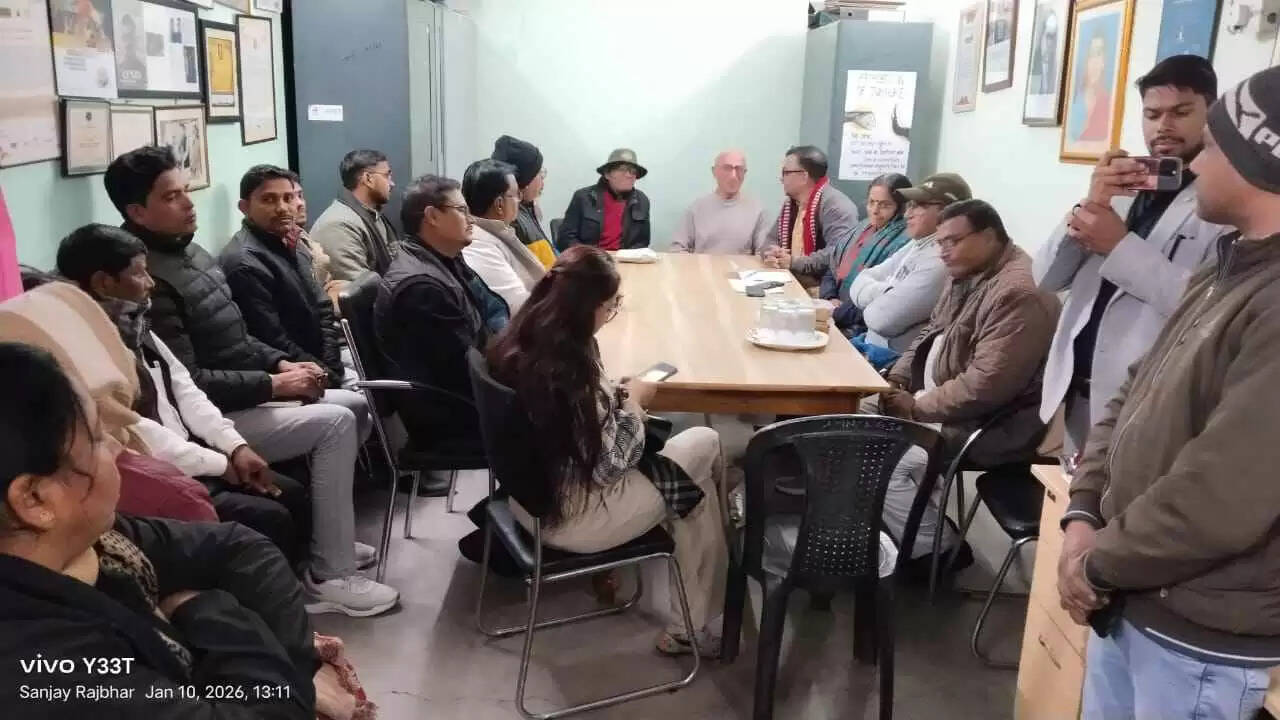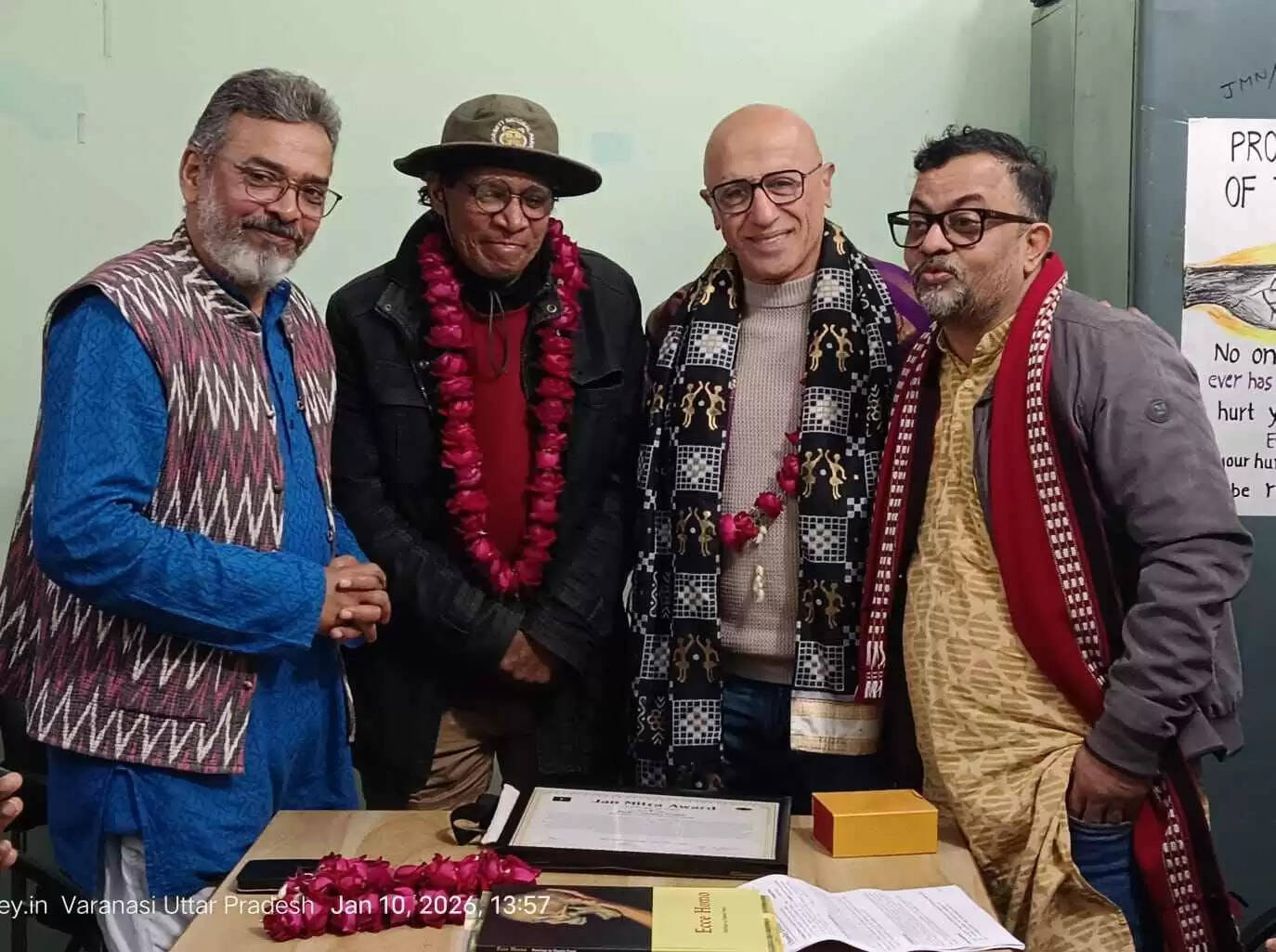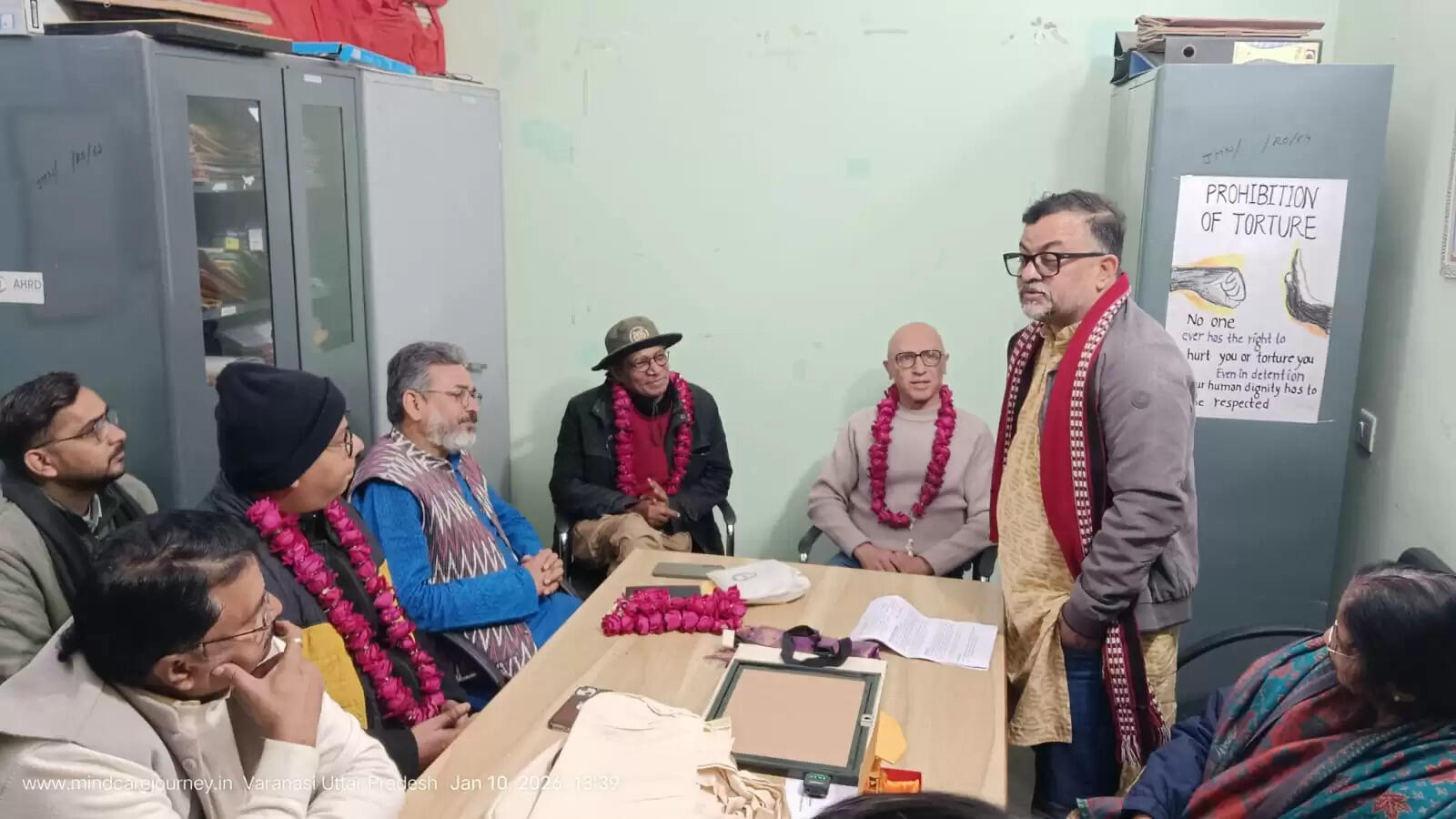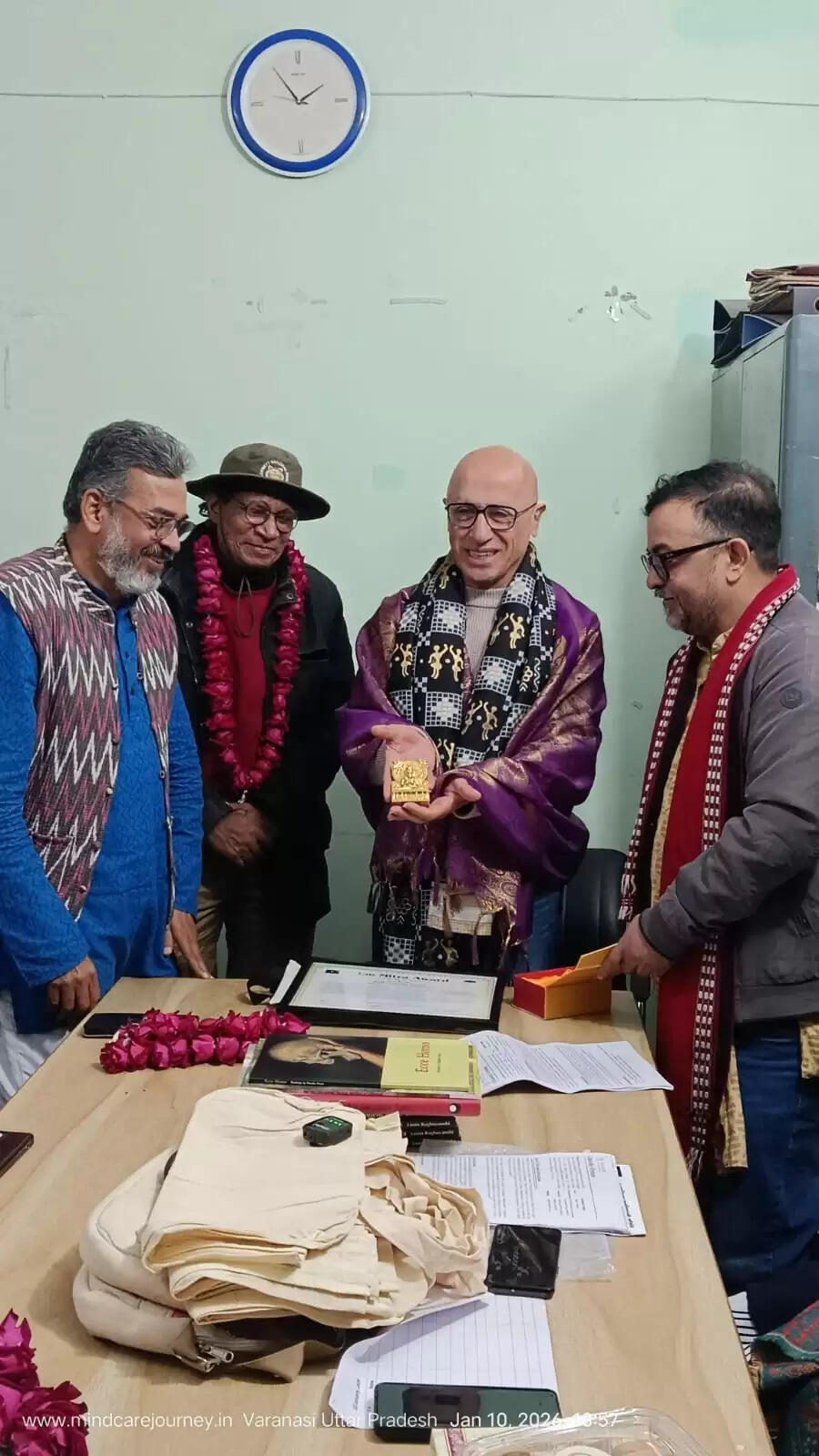Varanasi | 22 January 2026 | People’s Vigilance Committee on Human Rights (PVCHR)
The room was silent—not because there was nothing to say, but because every word carried the weight of irreversible loss.
On 22 January 2026, at the office of the People’s Vigilance Committee on Human Rights (PVCHR) in Varanasi, an honour ceremony was held. It was not a public celebration, not an award function, and not a symbolic gesture. It was a therapeutic moment, carefully grounded in the principles of testimonial therapy, narrative healing, active listening, and empathy.
At the centre of this moment sat Smt. Anju Devi, a mother who has lost both her son and her daughter in the aftermath of alleged police brutality and custodial violence. Beside her sat her husband, Narayan Prasad, a daily wage labourer, quiet and withdrawn, carrying grief that words could barely hold.
As part of the testimonial therapy process, Anju Devi’s testimony was read aloud—slowly, respectfully, without interruption. This was not done to interrogate her pain, but to return her story to her, spoken back with dignity. As she listened, her body began to tremble. She broke down repeatedly. Tears flowed, silence followed, and then more tears.
Shruti Nagvanshi and Chhaya Kumari, representing PVCHR, stepped forward not as officials, but as witnesses. Through a simple act of honouring—placing a colorful Testimony in her hands, holding her gaze, and listening without judgment—they affirmed a central truth of testimonial therapy:
Your suffering is real.Your voice matters.You are not alone.Your life has dignity.
This honour ceremony did not attempt to erase grief. It did something far more important—it restored agency. It transformed Anju Devi from a silent victim into a narrator of truth, a woman whose pain was no longer invisible or dismissed.
Narayan Prasad remained silent throughout the ceremony. His eyes were fixed on the floor. Yet his presence spoke volumes. For men like him—poor, illiterate, repeatedly betrayed by institutions—being listened to without fear or humiliation is itself a radical act.
This moment marked the beginning of narrative repair. Through collective witnessing, empathy, and ethical listening, the family’s trauma was no longer carried alone. Their story was no longer buried under fear.
What followed—legal struggle, NHRC proceedings, and demands for accountability—must be understood in this context:
A Father’s Testimony: “I Am Illiterate, But I Know Injustice”
“My name is Narayan Prasad. I am 50 years old. I am illiterate. I work as a labourer. I had two sons and one daughter. Because of the police, my younger son Vijay, who was only 21 years old, is no longer alive.”
Narayan Prasad lives in Hanumanganj Pateeha, Korav Police Station, Prayagraj district, Uttar Pradesh. His testimony is not a legal argument. It is a lived account of how state violence and corruption dismantle entire families.
On 9 September 2023, Vijay returned home from Varanasi after bathing at the Triveni Sangam. The next morning, at around 6 a.m., while Vijay was sleeping and Narayan was away at work, two police vehicles arrived. Inside were 20–21 police personnel, some in uniform, others in plain clothes.
Without explanation, they began beating Vijay. When his mother tried to intervene, a male police officer grabbed her hair, abused her, and threw her onto a stone, rendering her unconscious. Vijay was taken away without any warrant or information.
For hours, the family searched for him. Local police stations denied custody. Fear began to take hold.
The next day, 11 September 2023, after repeated attempts and emails to the Chief Minister’s portal and the Police Commissioner, villagers informed Narayan that the police vehicle bore the marking UP73. After multiple failed calls, they finally learned that Vijay was illegally detained at Charwa Police Station, Kaushambi.
From Custody to a Staged Encounter
On 12 September 2023, police changed Vijay’s clothes and took him to a forest area in Kaushambi. According to the family’s testimony:
-
His hands and mouth were tied
-
A pistol was forced into his hands
-
A video was recorded while police shouted “catch him”
-
Shots were fired, hitting Vijay in the right shoulder
Vijay was taken to Swaroop Rani Hospital, where police continued to abuse him, calling him a “dacoit” and demanding to know where he had hidden money. When his mother pleaded, police told her:
“Go and arrange thirty thousand rupees. Only then will your son be operated on.”
Earlier, during the so-called “search,” police had already taken the family’s jewellery, land documents, and Aadhaar cards, which remain unrecovered.
Left with nothing, Narayan borrowed money at high interest from the village landlord.
Medical Neglect and Death
Vijay’s surgery took place on 19 September 2023. At 3 a.m. on 20 September, the family was allowed to see him. His shoulder was bleeding. He whispered to his sister:
“Take me away from here… otherwise the police will kill us.”
Minutes later, after an injection, blood began to flow from his mouth and nose. Vijay died in front of his parents’ eyes.
The police immediately took his body to the mortuary. The family was not allowed to take him home. They were pressured to bury him immediately. When they resisted, police followed them continuously, guarding the house through the night, fearing public protest.
Even grief was controlled and surveilled.
Legal Betrayal: Violence Inside the Justice System
Seeking justice, Narayan approached the courts. What followed was another form of violence.
His lawyer, Shivdatt Mishra (also known as Satendra) of Prayagraj District Court, colluded with police. Under the pretext of “compromise,” Narayan, his wife, and daughter were taken to a hotel room near the court, where:
-
A police officer demanded ₹4.5 lakh to settle the case
-
When they refused, lawyers locked the chamber
-
Narayan was beaten
-
His daughter was assaulted
-
His wife’s hair was pulled
When they escaped and sought help from women police officers nearby, they were told to leave or risk being beaten again.
Justice itself became a site of terror.
A Family Destroyed Beyond the Death
Vijay’s sister Khushboo, deeply attached to her brother, could not survive the trauma. She stopped eating, speaking, and smiling. Eventually, she died from psychological shock.
Anju Devi now lives with constant fear, panic attacks, fainting spells, and trauma triggers. Narayan Prasad lives in silence, unable to sleep, haunted by his son’s face.
NHRC Proceedings and the Rejoinder
The case is registered before the National Human Rights Commission (NHRC) under Case No. 26139/24/4/2023-AFE. Despite repeated NHRC directions, police authorities have failed to submit crucial reports, including:
-
Ballistic Expert Report
-
Post-mortem videography
-
Wireless logs
-
Identification and hand-over memos
On 22 January 2026, PVCHR submitted an urgent rejoinder highlighting:
-
Persistent non-compliance with NHRC orders
-
The family’s continuing fear and vulnerability
-
The need for immediate protection
-
Interim relief and rehabilitation
-
Accountability for erring officials
-
An independent, high-level investigation
The rejoinder asserts that this case represents a grave violation of the right to life with dignity under Article 21 of the Indian Constitution.
Why This Story Matters Beyond India
Narayan Prasad’s testimony reflects global patterns of:
-
Custodial violence
-
Criminalisation of poverty
-
Corruption within legal systems
-
Trauma passed across generations
-
Silencing of marginalised voices
Yet it also reveals something else: truth survives when people listen.
From Silence to Resistance
The honour ceremony at PVCHR was not symbolic. It was therapeutic, political, and human. It marked the moment when suffering was no longer invisible, when trauma was met with empathy, and when dignity was restored through listening.
Justice begins here—not in verdicts alone, but in witnessing.
PVCHR stands with this family not until sympathy fades, but until truth, accountability, and dignity are secured.
Further Reading & Documentation
Hindi testimony & family narrative:
https://pvchr-folkschool.blogspot.com/2026/01/blog-post.htmlDetailed betrayal & corruption account:
https://pvchr.blogspot.com/2023/10/a-tragic-tale-of-betrayal-seeking.htmlNHRC proceedings & follow-up:
https://testimonialhealing.blogspot.com/2025/08/national-human-rights-commission-calls.htmlUrgent Rejoinder Seeking Immediate Protection and Rehabilitation – NHRC Case No. 26139/24/4/2023-AFE
https://testimonialhealing.blogspot.com/2026/01/fwd-urgent-rejoinder-seeking-immediate.html


.jpeg)


.jpeg)







.jpeg)
_page-0001.jpg)


.jpg)



















